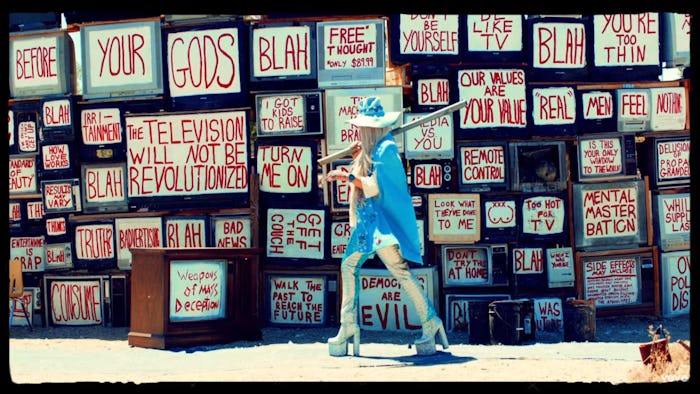After a very long absence, Kesha has returned with her first solo track in years. The song will be included on her new album, Rainbow, due out on Aug. 11. It's the singer's first full-length album since 2012's Warrior. But what is Kesha's "Praying" about? The song details Kesha's journey during her time away from the studio, through mental illness, alleged abuse, spiritual awakening, and finally, finding peace. Judging by the accompanying video, I doubt Kesha would disagree with the suggestion that this is her Lemonade.
The track begins with a spoken word verse, as Kesha ponders, "If there is a God or whatever, something, somewhere, why have I been abandoned by everyone and everything I've ever known? I've ever loved? Stranded. What is the lesson? What is the point? God, give me a sign, or I have to give up." In an essay on Lenny Letter, the singer explained that she channeled her feelings into her music to find strength.
This song is about coming to feel empathy for someone else even if they hurt you or scare you. It's a song about learning to be proud of the person you are even during low moments when you feel alone. It's also about hoping everyone, even someone who hurt you, can heal.
Now that's strong.
Kesha went on to clarify that to her, "God is nature and space and energy and the universe," and prayer is "learning to let go and realize that the universe is in control." Praying for those who have wronged her brought her relief, she wrote, because dwelling on hate and anger only made her feel worse. "Don't let anyone steal your happiness!" And indeed, she wastes no time taking the high road on "Praying," even expressing gratitude to the unnamed (but surely inferred) alleged abuser. (The alleged abuser has denied all allegations from Kesha.) The lyrics to the first verse of "Praying" are, according to Genius: "Well, you almost had me fooled/Told me that I was nothing without you/Oh, but after everything you've done/I can thank you for how strong I have become."
That theme is repeated throughout the song; being told she was nothing and put through hell, and emerging strong and learning how to fight. And the chorus seems benevolent enough: "I hope you're somewhere praying, praying/I hope your soul is changing, changing/I hope you find your peace/Falling on your knees, praying." But there are a couple of lines that hint at more a more passive-aggressive "bless your heart" interpretation, such as "we both know all the truth I could tell," "some things, only God can forgive," and most tellingly, "When I'm finished, they won't even know your name." Does she really wish this person well? Maybe not, but who can fault her?
